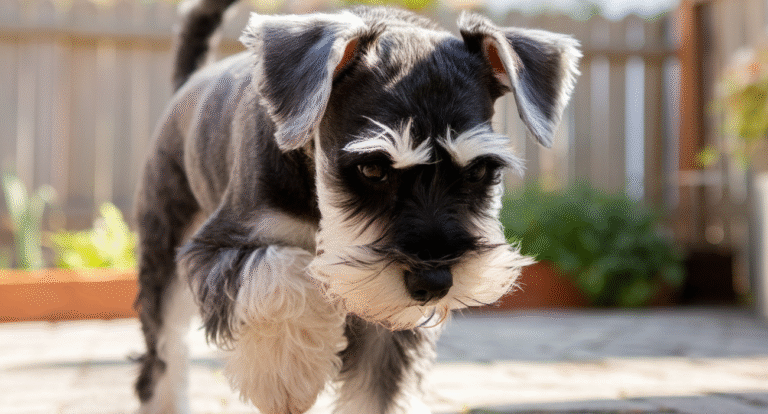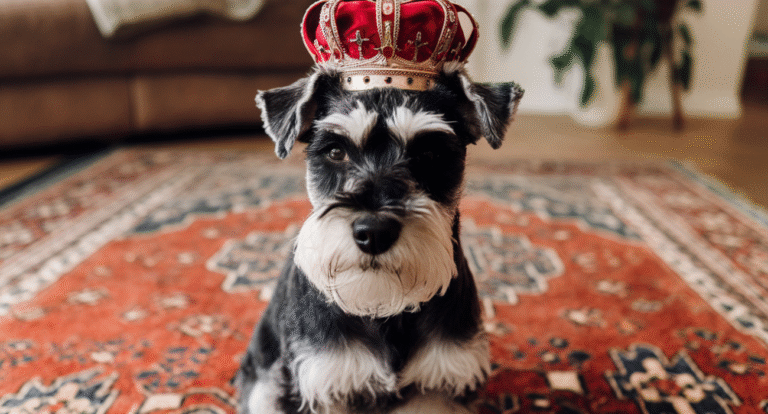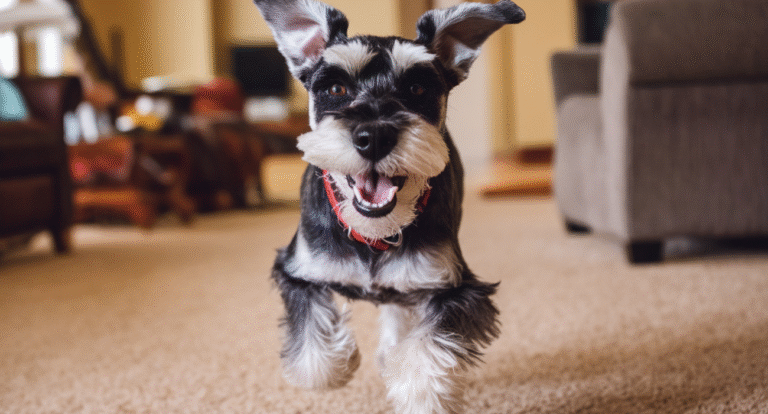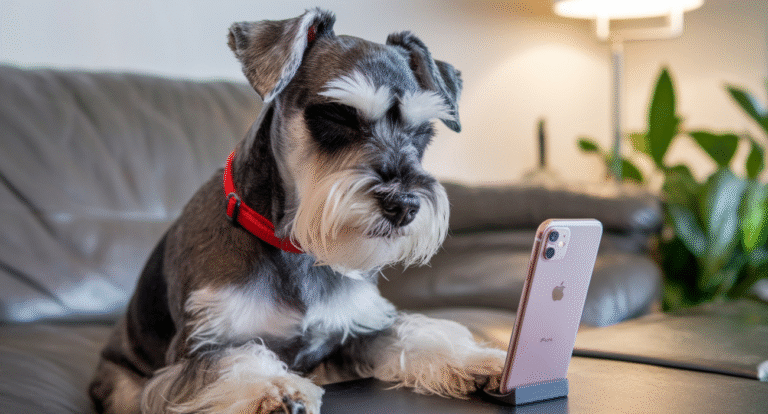Your Schnauzer’s sharp mind might surprise you. Learn why keeping them mentally active is just as important as daily walks.
Sitting on the couch after a long day, you might expect your dog to curl up beside you and relax. Instead, your Schnauzer is darting around the room, pawing at toys, and giving you that unmistakable look that says, “What’s next?” This is no accident. Your pup is wired with a sharp mind and an eagerness to stay busy, and that means mental exercise is just as important as physical activity.
The Heritage of a Working Mind
Miniature Schnauzers weren’t bred to be lap dogs, despite their adorable compact size. These little powerhouses have a serious work history that explains everything about their personality today. Originally developed in Germany during the late 1800s, they were the Swiss Army knives of farm life: rat catchers, guard dogs, and all-around farm helpers rolled into one feisty package.
This working background created dogs with razor-sharp intelligence and an almost obsessive need to have a job. Think of it this way: if your ancestors spent generations solving problems and thinking on their feet, you’d probably inherit some of that mental restlessness too. That’s exactly what happened with Miniature Schnauzers.
Their brains are essentially high-performance engines that need premium fuel in the form of mental challenges. Without it, all that intelligence has nowhere to go except into trouble. And trust us, a bored Schnauzer can get very creative with their mischief.
The Working Dog Genetics
What makes Miniature Schnauzers such mental athletes? It comes down to their working dog genetics combined with their terrier tenacity. Studies show that dogs bred for complex tasks develop enhanced problem-solving abilities and greater cognitive flexibility than their more laid-back cousins.
| Mental Stimulation Needs by Breed Type | Daily Requirements | Examples |
|---|---|---|
| Working Breeds (Schnauzers) | 45-60 minutes | Puzzle games, training, job-like tasks |
| Sporting Breeds | 30-45 minutes | Fetch variations, scent work |
| Toy Breeds | 15-30 minutes | Simple tricks, short games |
| Giant Breeds | 20-30 minutes | Gentle puzzles, calm training |
Miniature Schnauzers fall squarely in that high-needs category, requiring nearly an hour of dedicated brain work each day. That might sound like a lot, but remember: this doesn’t mean you need to become a dog trainer overnight. It means getting creative with how you challenge that brilliant little mind.
When Smart Dogs Get Bored: The Chaos Chronicles
Picture this scenario: you’ve given your Schnauzer a nice long walk, filled their food bowl, and settled in for a peaceful evening. Thirty minutes later, you discover they’ve redesigned your favorite throw pillow, barked at seventeen different shadows, and somehow figured out how to open the kitchen cabinet where you keep the treats.
A Schnauzer without mental stimulation is like a scientist without experiments: they’ll create their own research projects, and you probably won’t like the results.
The signs of an understimulated Schnauzer mind are impossible to miss:
The Classic Symptoms:
- Excessive barking at everything from delivery trucks to falling leaves
- Destructive behavior that seems to target your most valued possessions
- Escape artist tendencies that would make Houdini proud
- Attention-seeking behaviors that escalate until you have to respond
- Compulsive behaviors like excessive licking or spinning
These aren’t character flaws or signs of a “bad” dog. They’re actually testimonials to your Schnauzer’s intelligence. A less clever breed might just sleep when bored, but Schnauzers? They problem-solve their way into trouble.
The Mental Workout Menu: From Basic to Brain-Busting
The beauty of mental stimulation is that it doesn’t require expensive equipment or hours of your time. What it requires is consistency and creativity. Think of yourself as your Schnauzer’s personal trainer, but for their brain.
Beginner Brain Builders
Start with simple activities that introduce the concept of working for rewards. Hide and seek with treats around the house turns your living space into an adventure zone. Even something as basic as making your Schnauzer sit and stay before meals engages their mind and reinforces your leadership.
Training sessions are mental gold mines. Teaching new tricks isn’t just about showing off at the dog park; it’s about giving your Schnauzer’s brain a satisfying challenge. The proud look in their eyes when they master “shake hands” or “play dead” is worth every minute you invest.
Intermediate Intelligence Games
Once your Schnauzer has mastered the basics, it’s time to level up. Puzzle toys that require multiple steps to release treats are perfect for this stage. Consider toys that require your dog to slide pieces, lift flaps, or manipulate different mechanisms.
Scent work taps into their natural abilities while providing serious mental exercise. Hide treats or favorite toys in increasingly difficult locations, and watch your Schnauzer’s detective instincts kick into high gear. You can even create “scent trails” by dragging treats along the floor and hiding the prize at the end.
Advanced Mental Athletics
For the Einstein-level Schnauzers (and trust us, many reach this level), you need graduate-level challenges. Teach them the names of their toys and ask them to fetch specific items. Create obstacle courses that require them to think through each challenge. Some Schnauzers even excel at learning household chores like putting away their toys or bringing you specific items.
The goal isn’t to exhaust your Schnauzer’s mind, but to satisfy it. A mentally fulfilled dog is a happy dog, and a happy dog makes for a peaceful home.
The Bonding Jackpot
Here’s the secret bonus of mental stimulation: every brain game you play together strengthens your relationship. When you become the source of interesting challenges and mental adventures, your Schnauzer doesn’t just see you as the food dispenser or door opener. You become their favorite puzzle to solve, their most trusted teammate, and their preferred adventure companion.
This bonding effect creates a positive feedback loop. The more mentally engaged your Schnauzer becomes, the more attuned they are to your cues and commands. They start anticipating your needs, reading your body language more accurately, and responding more eagerly to training. It’s like upgrading your communication system from dial-up to fiber optic.
Regular mental stimulation also builds confidence in naturally anxious or shy Schnauzers. Successfully solving puzzles and mastering new skills creates a sense of accomplishment that translates into overall emotional resilience.
The Daily Brain Game Blueprint
Creating a sustainable mental stimulation routine doesn’t mean overhauling your entire schedule. Instead, think about integrating brain games into activities you’re already doing:
- Morning Mind Warm-up: Start the day with a five-minute training session or puzzle feeder instead of just placing the food bowl down.
- Afternoon Adventures: Use part of exercise time for mental challenges like teaching your Schnauzer to navigate obstacles or find hidden treats during walks.
- Evening Enrichment: Wind down with calm activities like practicing “settle” commands or gentle puzzle toys that encourage relaxation while still engaging the mind.
Consistency beats intensity every time. Fifteen minutes of daily mental exercise will transform your Schnauzer’s behavior more effectively than hour-long sessions once a week.
The key is variety. Just like humans get bored with the same workout routine, Schnauzers need different types of mental challenges to stay engaged. Rotate between training, puzzle toys, scent work, and games to keep their minds guessing.
Your Schnauzer’s Cognitive Career Path
Understanding your Miniature Schnauzer’s need for mental stimulation isn’t just about preventing behavioral problems. It’s about honoring their intelligence and giving them opportunities to be their best selves. These dogs were bred to think, problem-solve, and work alongside humans. When we provide appropriate mental challenges, we’re not just keeping them busy; we’re allowing them to fulfill their genetic destiny.
The investment in your Schnauzer’s mental health pays dividends in every aspect of your life together. A mentally satisfied Schnauzer is more relaxed during downtime, more responsive during training, and more adaptable to new situations. They become the companion you dreamed of when you first brought them home: intelligent, engaging, and utterly devoted to your shared adventures.
So yes, Miniature Schnauzers absolutely require substantial mental stimulation. But here’s the plot twist: providing it will become one of the most rewarding parts of dog ownership. Watching your clever companion solve puzzles, master new skills, and engage with the world around them transforms pet ownership into a delightful partnership with one of nature’s most entertaining intellectuals.






